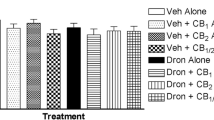Abstract
Although histamine inhibitors have been used in the motility-associated vertigo, the link between histamine and sleep deprivation (SD)-induced vertigo has not been clearly demonstrated. The histamine plasma levels were assayed in the SD volunteers before SD and 24 h after SD. Pinnacle’s automated sleep deprivation system was used to establish the female C57BL/6 mice SD model. Histidine decarboxylase inhibitor 4-bromo-3-hydroxybenzoic acid (BHOA), and antihistamine diphenhydramine (DPHM) were injected intraperitoneally to test their effects on SD-induced vertigo. Rotarod tests and vestibular scores 24 and 48 h post SD were utilized to assay the vestibular function. Western blot was used to determine the expression of histidine decarboxylase (HDC) in the vestibular, and PowerChrom was utilized to quantify the concentrations of cerebrospinal fluid (CSF) histamine. SD increased plasma concentration of histamine in humans. Upregulated HDC in the vestibular and increased CSF concentration of histamine can be detected in the SD mice, indicating vestibular dysfunction which can be ameliorated by both BHOA and DPHM. Histamine signaling inhibition may ameliorate SD-induced vertigo, and histamine can be considered as a potential treatment target.





Similar content being viewed by others
Abbreviations
- SD:
-
Sleep deprivation
- BHOA:
-
4-Bromo-3-hydroxybenzoic acid
- DPHM:
-
Diphenhydramine
- HDC:
-
Histidine decarboxylase
- CSF:
-
Cerebrospinal fluid
References
Berroa F et al (2014) The usefulness of plasma histamine and different tryptase cut-off points in the diagnosis of peranaesthetic hypersensitivity reactions. Clin Exp Allergy 44:270–277
Boadas-Vaello P, Riera J, Llorens J (2005) Behavioral and pathological effects in the rat define two groups of neurotoxic nitriles. Toxicol Sci 88:456–466
Brown RE, Stevens DR, Haas HL (2001) The physiology of brain histamine. Prog Neurobiol 63:637–672
Cozma S, Ghiciuc CM, Damian L, Pasquali V, Saponaro A, Lupusoru EC, Patacchioli FR, Dima-Cozma LC (2018) Distinct activation of the sympathetic adreno-medullar system and hypothalamus pituitary adrenal axis following the caloric vestibular test in healthy subjects. PLoS One 13:e0193963
Duggal HS (2001) Neuroleptic malignant syndrome precipitated by promethazine and lorazepam Australian & New Zealand. J Psychiatry 35:250–251
Ellenbroek BA, Ghiabi B (2015) Do histamine receptor 3 antagonists have a place in the therapy for schizophrenia? Curr Pharm Des 21:3760–3770
Fischer AJ (1991) Histamine in the treatment of vertigo. Acta Otolaryngol Suppl 111:24–28
Gaboyardniay S, Travo C, Saleur A, Broussy A, Brugeaud A, Chabbert C (2016) Correlation between afferent rearrangements and behavioral deficits after local excitotoxic insult in the mammalian vestibule: a rat model of vertigo symptoms. Dis Model Mech 9:1181–1192
Grundgeiger T, Bayen UJ, Horn SS (2014) Effects of sleep deprivation on prospective memory. Memory 22:679–686
Gupta A (2018) Sleep deprivation therapy enhanced via repetitive transcranial magnetic stimulation in major depression. Cureus 10:e2174
Huang H, Li Y, Liang J, Finkelman FD (2018) Molecular regulation of histamine synthesis. Front Immunol 9:1392
Iritani S (2013) What happens in the brain of schizophrenia patients?: an investigation from the viewpoint of neuropathology. Nagoya J Med Sci 75:11–28
Ito C (2004) The role of the central histaminergic system on schizophrenia. Drug News Perspect 17:383–387
Kim SK, Kim JH, Jeon SS, Hong SM (2018) Relationship between sleep quality and dizziness. PLoS One 13:e0192705
Konomi U et al (2014) Assessment of sleep disturbance using the Pittsburgh Sleep Quality Index in patients with dizziness. Equilib Res 73:502–511
Kovacova-Hanuskova E, Buday T, Gavliakova S, Plevkova J (2015) Histamine, histamine intoxication and intolerance. Allergol Immunopathol 43:498–506
Lacour DM, Sterkers O (2001) Histamine and betahistine in the treatment of vertigo. CNS Drugs 15:853–870
Liu Y, Zeng H, Pediani JD, Ward RJ, Chen LY, Wu N, Ma L, Tang M, Yang Y, An S, Guo XX, Hao Q, Xu TR (2018) Visualization of the activation of the histamine H3 receptor (H3R) using novel fluorescence resonance energy transfer biosensors and their potential application to the study of H3R pharmacology. FEBS J 285:2319–2336
Nietoalamilla G, Marquezgomez R, Garciagalvez AM, Moralesfigueroa GE, Ariasmontano JA (2016) The histamine H3 receptor: structure, pharmacology and function. Mol Pharmacol 90:649–673
Passani MB, Lin JS, Hancock A, Crochet S, Blandina P (2004) The histamine H receptor as a novel therapeutic target for cognitive and sleep disorders. Trends Pharmacol Sci 25:618–625
Rosenbaum A, Winter M (2017) Is betahistine effective for Ménière’s disease? Medwave 17:e7068
Seok JI (2008) Residual dizziness after successful repositioning treatment in patients with benign paroxysmal positional vertigo. J Clin Neurol 4:107
Seyed Tootoonchi SJ, Ghiasi S, Shadara P, Samani SM, Fouladi DF (2016) Hearing function after betahistine therapy in patients with Ménière’s disease. Braz J Otorhinolaryngol 82:500–506
Tighilet B, Léonard J, Watabe I, Bernard-Demanze L, Lacour M (2018) Betahistine treatment in a cat model of vestibular pathology: pharmacokinetic and pharmacodynamic approaches. Front Neurol 9:431
Vannimercier G, Gigout S, Debilly G, Lin JS (2003) Waking selective neurons in the posterior hypothalamus and their response to histamine H3-receptor ligands: an electrophysiological study in freely moving cats. Behav Brain Res 144:227–241
Weidt S, Bruehl AB, Straumann D, Hegemann SC, Krautstrunk G, Rufer M (2014) Health-related quality of life and emotional distress in patients with dizziness: a cross-sectional approach to disentangle their relationship. BMC Health Serv Res 14:317
Whalen TC, Gittis AH (2018) Histamine and deep brain stimulation: the pharmacology of regularizing a brain. J Clin Invest. https://doi.org/10.1172/JCI124777
Author information
Authors and Affiliations
Corresponding authors
Ethics declarations
The investigation was approved by the Ethics Committee of the Second Affiliated Hospital of Jiaxing University, and all volunteers provided signed written consent forms before enrollment and agreed to the anonymous data utilization policy. The entire experimental procedure was approved by the Ethics Committee of the Second Affiliated Hospital of Jiaxing University.
Conflict of Interest
These authors declare that they have no conflict of interest.
Additional information
Publisher’s Note
Springer Nature remains neutral with regard to jurisdictional claims in published maps and institutional affiliations.
Electronic Supplementary Material
ESM 1
(DOCX 58 kb)
Rights and permissions
About this article
Cite this article
Qian, S., Wang, Y. & Zhang, X. Inhibiting Histamine Signaling Ameliorates Vertigo Induced by Sleep Deprivation. J Mol Neurosci 67, 411–417 (2019). https://doi.org/10.1007/s12031-018-1244-6
Received:
Accepted:
Published:
Issue Date:
DOI: https://doi.org/10.1007/s12031-018-1244-6




